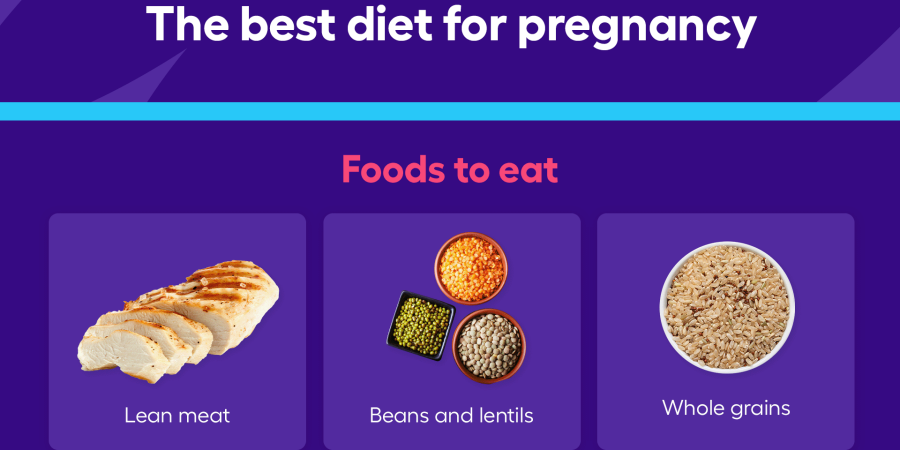

Dairy products During pregnancy, you’ll need extra protein and calcium to meet your baby’s needs. Dairy products like milk, cheese, and yogurt are good choices. Dairy products contain two types of high-quality protein: casein and whey. Dairy is the best dietary sourceTrusted Source of calcium. It also provides phosphorus, B vitamins, magnesium, and zinc. Yogurt, especially Greek yogurt, may be especially beneficial. Some varieties also contain probiotic bacteria, which support digestive health. If you’re lactose intolerant, you may also be able to tolerate yogurtTrusted Source, especially probiotic yogurt. Check with your doctor to see if you can test it out. A whole world of yogurt smoothies, parfaits, and lassi could be waiting. 2. Legumes These include lentils, peas, beans, chickpeas, soybeans, and peanuts. Legumes are great plant-based sources of fiber, protein, iron, folate, and calcium — all of which your body needs more of during pregnancy. Folate is one of the most essential B vitamins (B9). It’s very important for you and your baby, especially during the first trimester, and even before. You’ll need at least 600 micrograms (mcg) of folateTrusted Source every day, which can be a challenge to achieve with foods alone. But legumes can boost your folate levels along with supplementation based on your doctor’s recommendation. Legumes tend to be high in fiber, and some are also high in iron, magnesium, and potassium. Consider adding legumes to your diet with meals like hummus on whole grain toast, black beans in a taco salad, or a lentil curry.
What nutrients do I need during pregnancy to keep my baby and me healthy? During pregnancy, you can get a lot of nutrients from different sources or food groups such as grains, proteins, vegetables, fruits, and dairy. Other sources of nutrients are fats and vitamins and minerals. Proteins help your body with muscle and tissue growth and also with your baby’s growth. Protein can be found in foods like: Beef, pork, fish and poultry Eggs Milk, cheese and other dairy foods Beans and peas Nuts and Seeds Soy products like tempeh and tofu Carbohydrates are found in food like grains and they’re your body’s fuel to help you do your activities. There are different types of carbohydrates. Foods can have a combination of all three types of carbohydrates. Simple carbohydrates are broken down fast, spiking your blood sugar quickly. It’s best to limit foods high in simple carbohydrates like: Table sugar Certain breakfast cereals Sugary desserts Complex carbohydrates give longer lasting energy and can be found in: Whole grain products, like bread, rice and pasta Beans Starchy vegetables like potatoes and corn Fiber is also a type of complex carbohydrate and can be found in plant foods. Fiber can help with digestion. The following foods are good sources of fiber: Vegetables such as cabbage, spinach, kale Fruits like, berries, oranges, apples and peaches with the skin Legumes such as chickpeas, black beans, lentils.
When it comes to eating well, try to focus on keeping it simple. Avoid eating packaged ultra-processed foods that have sugar and salt added. Instead, choose foods that are unprocessed or minimally processed, including: fruit and vegetables pulses, nuts and seeds meat, fish and eggs milk, cheese and yoghurt foods such as potato, rice and pasta. It is also important to be aware of some foods and drinks you should avoid during pregnancy. This is because they can cause an increased risk of problems for you and your baby. Some people feel that they are struggling to eat well during pregnancy for different reasons, including feeling sick or reasons related to mental health. If you feel you need some support, speak to your GP or midwife. The Eatwell guide On average, women should have around 2,000 calories a day. If you are in your third trimester of pregnancy you may need to eat an extra 200 calories depending on how active you are. The NHS has created an Eatwell Guide to help you understand how much of each food group should make up these 2000 calories. You do not need to follow these proportions for every meal, but try to get the balance over a day or even a week. Understanding food labeling can help you choose a healthy mix of foods when you are shopping.
